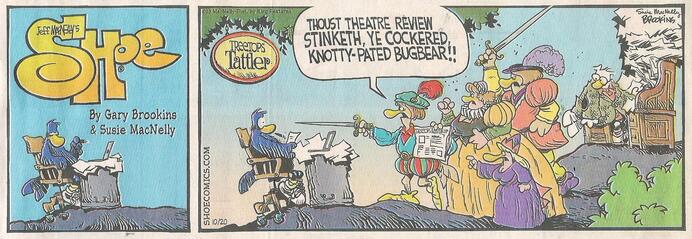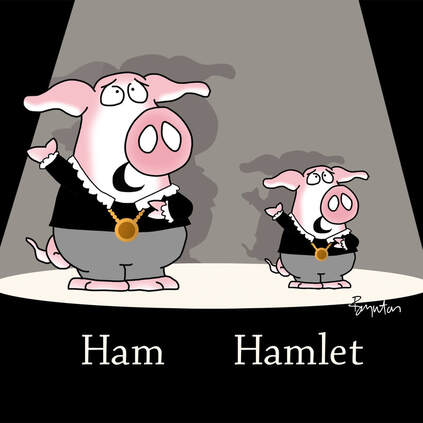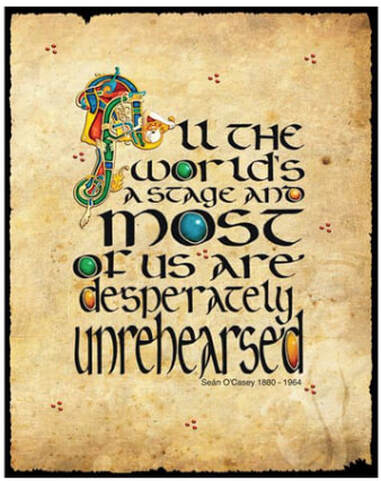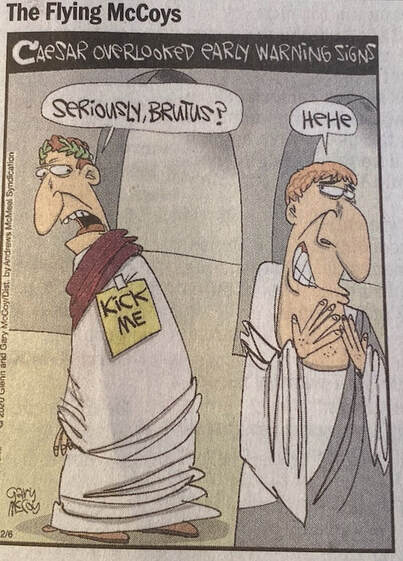There are those, strangely enough, who think Will Shakespeare of Stratford-Upon-Avon is highly over-rated and probably didn't really write the plays he is credited with having produced. Of the 70 something proposed candidates for the one (or the group) who DID actually write those plays, Edward de Vere, 17th Earl of Oxford has been the most popular choice in recent years. Personally, based on my reading of several books by a number of prominent scholars, I find the whole idea preposterous, but I AM prejudiced, and you can make up your own mind. Some people suggest that Will's historical presence is so small as to create doubt over the possibility of his writing poems and plays.
So, what DO we actually KNOW about Will Shakespeare? Actually, we know a fair amount (more than we know about some of his contemporaries) but a good deal less than we WISH we did! First, we know that he DID actually exist! He was born in Stratford in April of 1564, but the exact day is uncertain. He WAS baptized on April 26, however. That record exists in Holy Trinity Church. He grew up, married Anne Hathaway of Shottery when he was 18, had three children with her and, eventually, left Stratford and went "missing" for several years. Sometime between 1585 and 1592, he turned up in London as a poet(?), playwright(?), collaborator (at times) and actor with one of the major theatre companies. He was also a part-owner of that company (established in records from the time). He continued in this (these) capacity (capacities) until about 1613, when he retired back to Stratford, although he did make several purchases of Stratford real estate and a variety of investments in grain and other commodities, which assisted him in making quite a reasonable fortune for a non-aristocrat during the period.
While in London, his presence was recorded in a number of legal papers; he was also referred to (by others) as a member of "The Lord Chamberlain's Men" (later "The King's Men"). These references include references to him as one of the leading members of the company in official court documents. He is also referred to by numerous sources during this period as being a playwright and a poet. Numerous plays and some poems were published over his name during his lifetime, but there is little evidence that positively proves that he wrote them, and some (perhaps most) were, apparently, published without his permission. Of course, the common practice of the time did NOT include such things as "intellectual property rights," so plays became the property of companies, NOT playwrights and, once published were open for all to perform. Therefore, companies guarded their scripts closely as they had no recourse against others performing plays which they had paid for and the stealing, or pirating, of scripts was not uncommon.
Will died in 1616 and was interred in Holy Trinity Church in Stratford. So, we also have his burial record (to say nothing of the actual tomb, complete with curse) in Holy Trinity Church. We also have his will preserved as a legal document. In 1623, two of his theatre company colleagues published a folio version of Mr. William Shakespeare's Comedies, Histories, & Tragedies. This is, of course, what is known as the "First Folio." The fact that it was published by John Hemings and Henry Condell, two established members of "The King's Men," who would have known Shakespeare well (they are left bequests in his will). Thus, it would seem that they believed that Shakespeare was the author of these plays, in addition to other evidence which exists from his lifetime.
I would argue that this establishes quite a strong case that Will Shakespeare not only existed, but that people during the period at least thought he was a playwright, as well as an actor. If he wasn't, I think one would have to say that we are dealing with probably the largest and most complex conspiracy theory ever (except, perhaps, for the resurrection of Jesus). I admit that I am a "Stratfordian," but I believe that the evidence is strong enough to support this position above all others. If you disagree, that's okay, I just think you are incorrect, and I'd sure like to see your evidence and hear your argument.
In any case, I like to celebrate Shakespeare's Birth/Death Day in my own, small fashion, so I thought I would make this posting a portion of that celebration. I find others also engage in celebrating this day: The Folger Shakespeare Library in Washington, D.C. usually have quite a "todo" on the 23rd, although this year is having to rely on "virtual" events. The local Nebraska Shakespeare Company sponsors a "Talk Like Shakespeare Day" annually on April 23rd, which I've always though was a bit silly, but could be fun. However, it suggests to me an old "Shoe" cartoon which I've had on file for a good many years, (since 2013, I think) which seemed appropriate to the idea of Elizabethan language.
On the other hand, given that Will wrote plays for actors, one has to wonder how appropriate this cartoon might be when thinking about my favorite of Will's plays.
'Nuf said. I think that it's time for me to say, "Happy Birthday, Will." and call this post over.
I'll be back in a couple of weeks. I will admit that this coronavirus thing IS getting to me a bit. I'm not used to being tied up inside quite this much. I can't even go to the library, or the bookstore! I'll be VERY happy when we can stop this. Still, it's nice to be alive, so I guess I'll put up with it as long as necessary. I hope you do so, as well. It's the right thing to do!
LLAP
Dr. B










 RSS Feed
RSS Feed